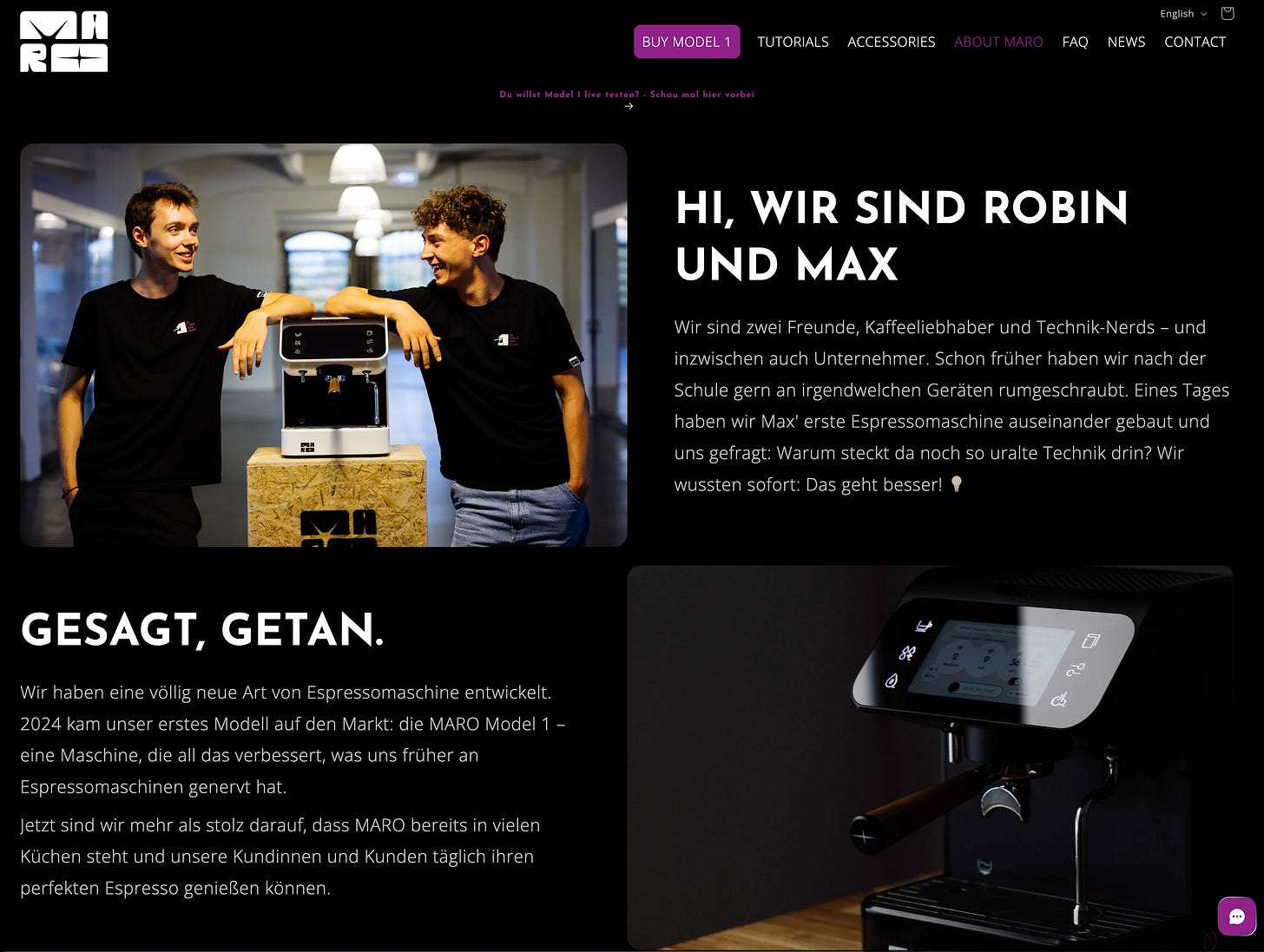MARO: How Two 20-Year-Olds Bootstrap a €5,000 Espresso Machine
Volume #29 of "Happy Bootstrapping" Newsletter
Max Grimm and Robin Kuprat were 20 when they started taking espresso machines apart. Today their company MARO sells the Model 1 for €4,999 – with IoT connectivity, software updates, and 430 individual parts. Nearly 400 machines later, they’re at seven-figure revenue and still bootstrapped.
This is a summary of Episode 140 of the “Happy Bootstrapping” Podcast (German).
The Founding Story: From a Broken Sage to Proprietary Technology
“I never actually had the idea to do a hardware startup,” Max recalls. The story began at a music boarding school, where his roommate woke him every morning with a coffee grinder. Max’s research into grind settings led him to espresso machines – and the realization: “They all basically say the same thing in the product descriptions.”
After six months of unsuccessful espresso experiments with a Sage machine (”20, 25 kilos of coffee wasted”), he bought a broken machine. The call to Robin, his tinkering buddy, changed everything:
“You don’t know, I don’t know, let’s not know together.”
Within ten days, the first PID controller was running. From the open espresso machine, 40 cables led to half a square meter of wood board. “You had to plug the power plugs into the sockets in the right order, then the USB cables into the laptop in the right order.”
The Business Model: Premium Hardware with a Software Soul
The MARO Model 1 costs €4,999 (white) or €5,199 (black):
430 individual parts per machine
IoT connection for remote service
Software updates “over the air”
Three UI modes for different user types
37% of customers use beginner mode
“If only 429 of 430 parts are there, you build exactly zero machines,” Max explains the hardware challenge. They sold the first 40 machines at a loss, but have made margin since – “that we managed this, I’m really proud of.”
Support and Sales: WhatsApp Instead of Dealer Network
Support runs primarily through WhatsApp Business: “I don’t care about voice messages. If the customer wants to send voice messages, they send me voice messages.” Max’s private phone number was even listed on Google initially.
They deliberately have almost no dealers: “The margins dealers demand are sometimes simply much higher than the margin I even make.” Instead, they rely on:
Live demos in their new showroom in Suhl
Pop-up events throughout Germany
Direct sales with intensive consultation
One dealer in Switzerland (due to customs)
The Path to Production: From Music School to Electronics Company
The breakthrough came by chance: An entrepreneur with an electronics company provided them with a workshop.
“This is a grinder, this is a CNC mill, and the boss said you can use the rest.”
Robin and Max sometimes worked from 5:30 to 23:30, conducted eight months of basic research in thermodynamics. The Corona period forced them to use industrial components: “Sometimes really expensive, but available.”
Max’s Learnings from Four Years of Hardware Bootstrapping:
“When you start with this whole fuck around and find out thing, you have to pull through”
No discounts – “We have to pay these people”
Direct-to-consumer is the only scalable path
Support excellence creates trust for €5,000 products
At 24, you can build hardware too
“The reason behind MARO is to create something with our own strength,” Max says about investment offers. With now six full-time employees and three to four weeks delivery time, they continue growing organically.
What I Learned as an Interviewer
I found the combination of youthful naivety (”fuck around and find out”) and professional execution interesting in this episode.
The WhatsApp support story shows how necessity (private number on Google) can become a virtue. I liked Max’s transparency about margin challenges in hardware – “actually I’m glad we’re making any margin at all.”
His statement “bootstrapping is more of a moral quality seal” shows a reflective view on the topic. And that two 20-year-olds built an IoT-capable espresso machine while larger companies still work with mechanical solutions gives courage to other young founders.
Happy Bootstrapping is a German podcast where I interview bootstrapped founders, indie hackers, and solopreneurs about their startup journeys.
Over the years, I’ve connected with many successful entrepreneurs who have built e-commerce shops, SaaS platforms, mobile apps, content businesses, or hybrid models.
Furthermore I am a bootstrapper myself and growing my DevOps-as-a-Sercice and Web Operations Company “We Manage”.



